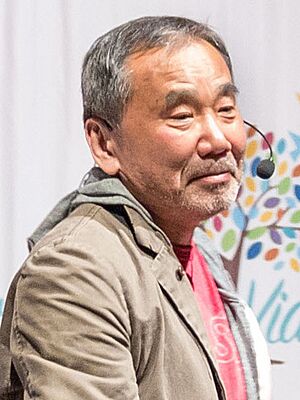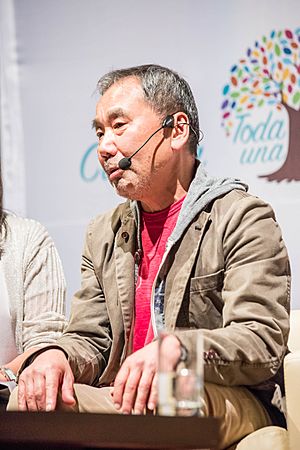Haruki Murakami facts for kids
Quick facts for kids
Haruki Murakami
村上 春樹 |
|
|---|---|

Murakami in 2018
|
|
| Born | January 12, 1949 Fushimi-ku, Kyoto, Japan |
| Occupation |
|
| Language | Japanese |
| Alma mater | Waseda University (BA) |
| Period | Contemporary |
| Genres |
|
| Literary movement |
|
| Notable works |
|
| Signature | |
 |
|
Haruki Murakami (村上 春樹, Murakami Haruki, born January 12, 1949) is a famous Japanese writer. His books, essays, and short stories have been huge successes in Japan and all over the world. His work has been translated into 50 languages and sold millions of copies.
He has won many important awards for his writing. These include the World Fantasy Award, the Franz Kafka Prize, and the Princess of Asturias Awards.
Murakami grew up near Kobe and later moved to Tokyo for college. Before becoming a full-time writer, he owned a small jazz bar for seven years. He published his first novel, Hear the Wind Sing, in 1979. Some of his most well-known novels are Norwegian Wood (1987), The Wind-Up Bird Chronicle (1994–95), and Kafka on the Shore (2002). His book 1Q84 (2009–10) was even called the best work of Japan's Heisei era by experts.
His stories often mix different styles, like science fiction, fantasy, and crime fiction. He is especially known for using magical realist elements, where strange or impossible things happen in a normal world. Murakami has also written five collections of short stories and non-fiction books. One non-fiction book, Underground (1997), shares interviews about a big event in the Tokyo subway. Another, What I Talk About When I Talk About Running (2007), is about his love for running.
Some literary critics have different opinions about his books. Some Japanese critics felt his style was "un-Japanese." However, many others, like Steven Poole from The Guardian, have called him "among the world's greatest living novelists."
Contents
About Haruki Murakami
Murakami was born in Kyoto, Japan, in 1949. He grew up in different cities like Nishinomiya, Ashiya, and Kobe. He was an only child. His father was a Buddhist priest's son, and his mother was a merchant's daughter. Both of his parents taught Japanese literature.
As a child, Murakami was very interested in Western culture, especially music and books from Europe and America. He read many works by writers like Franz Kafka and Kurt Vonnegut. These influences made his writing different from many other Japanese authors.
Murakami studied drama at Waseda University in Tokyo. His first job was at a record store. Before finishing college, he opened a coffee house and jazz bar called Peter Cat. He ran this bar from 1974 to 1981.
He met Yoko Takahashi in Tokyo, and they got married after university. Yoko helped him run the jazz bar. They decided not to have children.
Murakami is also a dedicated marathon runner and loves triathlons. He started running when he was 33 years old to stay healthy. In 1996, he finished a very long 100 km race around Lake Saroma in Hokkaido, Japan. He wrote about how running affects his creative life in his 2007 book, What I Talk About When I Talk About Running.
His Journey as a Writer
Murakami started writing fiction when he was 29. He said he was just an "ordinary person" running a jazz club before that. He was inspired to write his first novel, Hear the Wind Sing (1979), while watching a baseball game. He felt a "warm sensation" and knew he could write. He went home and started that night.
He worked on his first novel for ten months, writing in short bursts after his long days at the bar. He sent it to a literary contest and won first prize. This success encouraged him to keep writing.
Early Novels and the "Trilogy of the Rat"
A year later, he published a sequel, Pinball, 1973. In 1982, he released A Wild Sheep Chase, which was very popular with critics. Hear the Wind Sing, Pinball, 1973, and A Wild Sheep Chase are known as the Trilogy of the Rat. These books follow the same main character and his friend, "the Rat." Murakami felt his first two novels were "immature," but he said A Wild Sheep Chase was "the first book where I could feel a kind of sensation, the joy of telling a story."
Becoming Widely Known
In 1985, Murakami wrote Hard-Boiled Wonderland and the End of the World, a fantasy story with many magical elements. He became much more famous in 1987 with Norwegian Wood. This book was a nostalgic story about loss and relationships, and it sold millions of copies to young people in Japan.
Because of his sudden fame, Murakami was often surrounded by fans in public. This led him to leave Japan in 1986. He traveled through Europe and lived in the United States for a while. He now lives in Oiso, Kanagawa, Japan, and has an office in Tokyo.
While in the United States, he was a writing fellow at universities like Princeton University and Harvard University. During this time, he wrote South of the Border, West of the Sun and The Wind-Up Bird Chronicle.
Writing About Important Events
The Wind-Up Bird Chronicle (1995) mixes real-life events with fantastic ones. It also deals with more serious social topics, like difficult parts of history. This novel won the Yomiuri Prize.
Murakami's writing began to focus more on big, shared experiences. He returned to Japan after the Kobe earthquake and the Aum Shinrikyo gas attack. He explored these events in his non-fiction book Underground, which includes interviews with victims of the subway attack. He also wrote the short story collection after the quake.
Murakami explained that his time in the United States in the 1990s changed his writing from being more "personal" to more "involved" with society. He saw The Wind-up Bird Chronicle as a turning point in his career.
He has also translated many books by American writers like F. Scott Fitzgerald and Raymond Carver into Japanese. Murakami has been involved in the English translations of his own books, sometimes encouraging "adaptations" to fit American readers better.
Recent Works
Since 1999, Murakami has continued to publish many popular books. Sputnik Sweetheart came out in 1999, followed by Kafka on the Shore in 2002. Kafka on the Shore won the World Fantasy Award in 2006. His novel After Dark was released in English in 2007 and was named a "notable book of the year" by The New York Times.
In 2006, a collection of his short stories called Blind Willow, Sleeping Woman was published in English. This collection included both older and newer stories.
In 2007, his memoir about running, What I Talk About When I Talk About Running, was published in Japan. English versions came out in 2008. The title is a playful nod to Raymond Carver's short story collection What We Talk About When We Talk About Love.
In 2009, Murakami's novel 1Q84 was published in Japan. The title sounds like "1984" in Japanese. In April 2013, he published Colorless Tsukuru Tazaki and His Years of Pilgrimage, which became a worldwide bestseller.
His essay collection Novelist as a Vocation (2015) shares his thoughts on his life and writing career. Killing Commendatore was published in 2017.
Murakami's most recent novel, The City and Its Uncertain Walls, was published in Japan in April 2023. This long novel explores a "soul-stirring, 100% pure Murakami world." Murakami has said that the recent global events have created "walls that divide people," and his novel explores themes of isolation and empathy. The book is based on an earlier novella he wrote in 1980 that he was not satisfied with at the time.
In July 2024, The New Yorker magazine published his short story "Kaho."
Murakami's Writing Style
Most of Haruki Murakami's books are told from the first-person point of view, meaning the main character tells the story using "I." He says that because family is often very important in traditional Japanese literature, his main characters are often independent and value freedom and being alone.
Murakami's writing also has a unique sense of humor. For example, in his short story "Superfrog Saves Tokyo," the main character meets a six-foot-tall frog that talks about saving Tokyo over a cup of tea. Even when the story is serious, Murakami wants the reader to be entertained. His characters often comment on how strange the story is, which Murakami says is how he feels as he writes. He compares writing to making a movie just for himself.
His writing is often described as magical realism with surreal elements. This means that strange or dream-like things happen in a realistic setting without much explanation. However, Murakami himself doesn't think of his writing as surreal or magical realism. He says, "I simply write the stories that I want to write, and in a style that suits me." He feels the story flows naturally, and he just puts that flow into words.
Many of his novels have titles or themes inspired by classical music. For example, the three books in The Wind-Up Bird Chronicle are named after musical pieces or characters. Some of his novels are even named after songs, like Norwegian Wood (after The Beatles' song) and South of the Border, West of the Sun (after the song "South of the Border").
Some people see ideas from shamanism in his writing. For example, in The Wind-Up Bird Chronicle, a character goes down into a dry well, which some connect to Japanese shamanism. Murakami has also explained that he almost never bases his characters on real people. He feels that characters become "alive" as he writes and start to act on their own.
Awards and Recognition
Haruki Murakami has received many awards for his books and his overall contributions to literature.
Book Awards
- 1979: Gunzo Award for Hear the Wind Sing
- 1982: Noma Literary Prize for A Wild Sheep Chase
- 1985: Tanizaki Prize for Hard-Boiled Wonderland and the End of the World
- 1995: Yomiuri Prize for The Wind-Up Bird Chronicle
- 1999: Kuwabara Takeo Prize for Underground
- 2006: World Fantasy Award for Kafka on the Shore
- 2006: Frank O'Connor International Short Story Award for Blind Willow, Sleeping Woman
- 2016: Hans Christian Andersen Literature Award
- 2018: America Award in Literature for his lifetime of international writing
- 2022: Prix mondial Cinco Del Duca for his work that shows modern humanism
- 2023: Premio Princesa de Asturias de las Letras
Murakami also won the 2007 Kiriyama Prize for Fiction for Blind Willow, Sleeping Woman, but he chose not to accept it for personal reasons.
Personal Awards
In 2006, Murakami received the Franz Kafka Prize.
In January 2009, he received the Jerusalem Prize, an award given to writers whose work explores themes of human freedom and society. Despite some protests, Murakami chose to attend the ceremony in Israel. In his speech, he shared a powerful message: "If there is a hard, high wall and an egg that breaks against it, no matter how right the wall or how wrong the egg, I will stand on the side of the egg." He explained that each person is like a fragile egg, facing a big "system" or wall. He believes we must not let the system control us. That same year, he was named a Knight of the Order of Arts and Letters of Spain.
In 2011, Murakami donated his €80,000 prize money from the International Catalunya Prize to help victims of the March 11 earthquake and tsunami in Japan, and those affected by the Fukushima nuclear disaster. In his acceptance speech, he said that the Fukushima plant situation was "the second major nuclear disaster that the Japanese people have experienced." He felt that Japan should have learned from past events how much radiation harms the world.
Haruki Murakami is often mentioned as a possible winner of the Nobel Prize in Literature. However, he has joked that he doesn't want prizes because "That means you're finished."
In October 2014, he was awarded the Welt-Literaturpreis. In April 2015, Time magazine named him one of the 100 most influential people. In November 2016, he received the Danish Hans Christian Andersen Literature Award.
In 2018, he was nominated for the New Academy Prize in Literature but asked for his nomination to be removed. He said he wanted to "concentrate on writing, away from media attention."
In 2024, Murakami received the Golden Plate Award from the American Academy of Achievement.
Honorary Degrees
Murakami has received special honorary degrees (Doctor of Letters) from several universities. These include the University of Liège (2007), Princeton University (2008), Tufts University (2014), Yale University (2016), and University of Nova Gorica (2021).
Murakami's Archives
In 2018, Waseda University in Tokyo agreed to keep Haruki Murakami's archives. These include his original writings, important documents, and his music collection. In September 2021, a special library called the Waseda International House of Literature, or the Haruki Murakami Library, opened at Waseda University.
This library is dedicated to Murakami's works and holds over 3,000 of his books, including translations into more than 50 languages. It also has a coffee shop run by students, named Orange Cat after Murakami's old jazz bar. Visitors can also listen to records from Murakami's own collection in a special listening lounge.
Films and Other Adaptations
Many of Murakami's stories have been turned into films, plays, and other creative works.
His first novel, Hear the Wind Sing, was made into a film in 1981 by Japanese director Kazuki Ōmori. Short films have also been made from his stories "Bakery Attack" and "On Seeing the 100% Perfect Girl One Beautiful April Morning."
Japanese director Jun Ichikawa adapted Murakami's short story "Tony Takitani" into a 75-minute movie in 2005. This film was shown at various festivals. Elements of his story "The Second Bakery Attack" were used in the 1998 German film The Polar Bear and a 2010 short film starring Kirsten Dunst.
In 2003, a play called The Elephant Vanishes was created, based on three of Murakami's short stories. This play was praised for mixing video, music, and physical theater.
Two stories from his book after the quake—"Honey Pie" and "Superfrog Saves Tokyo"—were adapted for the stage in a play also called after the quake. This play first opened in 2007. In 2008, a play version of Kafka on the Shore was also performed.
In 2006, musician Max Richter's album Songs from Before featured Robert Wyatt reading parts of Murakami's novels.
In 2010, the French-Vietnamese director Tran Anh Hung directed a film adaptation of Norwegian Wood, which was released in Japan in December 2010.
A two-hour stage show based on The Wind-Up Bird Chronicle opened in New York City in 2010. This show used live actors, video, Japanese puppetry, and sound to bring the surreal story to life.
In 2013, pianist Eunbi Kim created a performance piece called "Murakami Music: Stories of Loss and Nostalgia," which used parts of Murakami's books.
Memoranda, a 2017 video game, is based on several of Murakami's short stories and features some of his characters.
In 2018, the short story "Barn Burning" from The Elephant Vanishes was made into a film called Burning by director Lee Chang-dong. This film won several awards and was South Korea's submission for the Academy Award for Best International Feature Film in 2019.
A film based on the short story "Drive My Car" premiered in 2021. This movie won Best International Feature at the Academy Awards and received three other nominations. Directed by Ryusuke Hamaguchi, it also took inspiration from other stories in the collection Men Without Women.
In 2022, director Pierre Földes adapted six of Murakami's short stories into an animated film called Blind Willow, Sleeping Woman.
In 2023, Jean-Christophe Deveney began adapting nine of Murakami's short stories into a three-volume original English-language manga series.
Murakami's Personal Life
After winning his first award in 1979, Murakami did not try to meet many other writers. He describes himself as a loner who doesn't enjoy being part of groups or literary circles. When he is working on a book, he relies on his wife, who is always the first person to read his new work.
Among other writers, he enjoys the books of Kazuo Ishiguro, Cormac McCarthy, and Lee Child. He doesn't read much modern Japanese literature but likes the works of Ryū Murakami and Banana Yoshimoto.
Murakami loves baseball and is a fan of the Tokyo Yakult Swallows. He has shared that attending a baseball game in 1978 was a special moment that made him decide to write his first novel.
He also has a great passion for music, especially classical music and jazz. When he was about 15, he became interested in jazz after going to an Art Blakey and the Jazz Messengers concert. He later opened his jazz bar, Peter Cat. Murakami has said that music, like writing, is a journey for the mind. He once wanted to be a musician but decided to become a writer because he wasn't very good at playing instruments.
In an interview, Murakami shared his belief that his unique books appeal to people especially during times of change or confusion. He noted that his books were very popular in Russia when the Soviet Union was changing, and in Germany when the Berlin Wall fell.
His Views on Society
Murakami has said that he sees himself as a person with political views, but he doesn't directly tell people what to think. He compares himself to George Orwell, saying he stands "against the system."
When accepting the Jerusalem Prize in 2009, he shared his view that if there's a big, strong "wall" (like a system or government) and a fragile "egg" (like an individual), he will always stand with the egg. He believes that systems can sometimes make people do things they wouldn't normally do.
Murakami has also spoken about historical disagreements between Japan and other countries. He believes it's important for Japan to apologize for past events until those countries feel they have apologized enough.
In January 2015, Murakami expressed his support for same-sex marriage, which is not recognized in Japan.
In August 2021, during one of his radio shows, Murakami shared his thoughts on how leaders handled big challenges, suggesting that some concerns were not fully addressed.
In 2022, during the Russian invasion of Ukraine, Murakami called for peace. He created a special radio program featuring music that encouraged an end to the conflict and focused on the importance of life.
Images for kids
See also
 In Spanish: Haruki Murakami para niños
In Spanish: Haruki Murakami para niños



